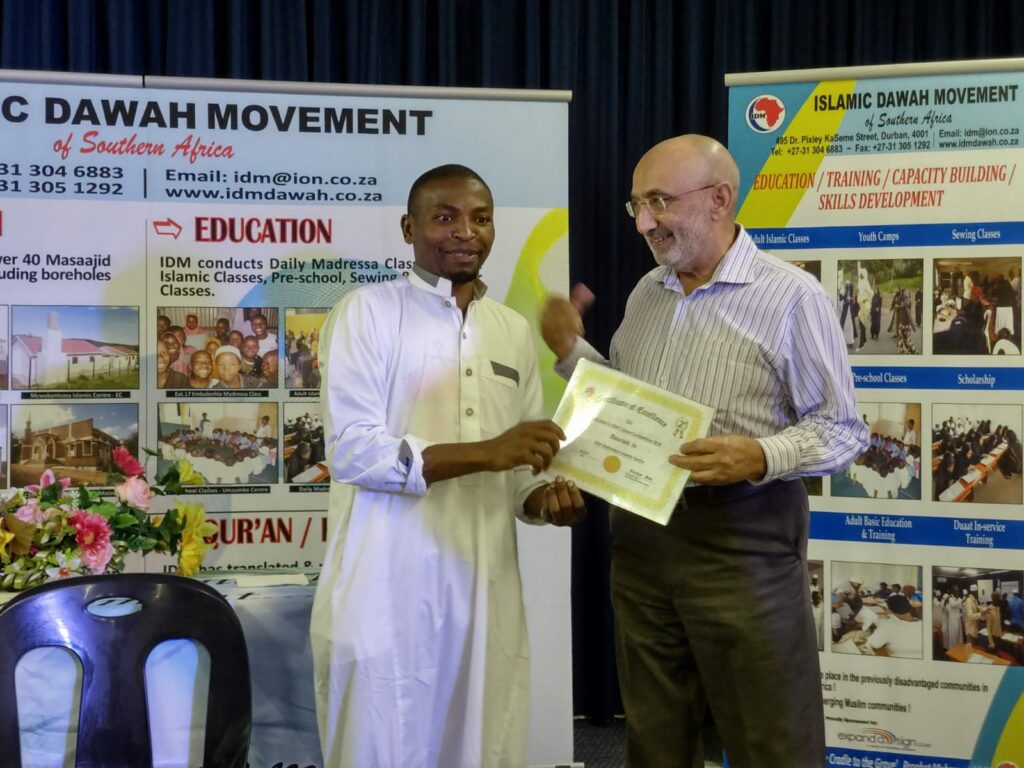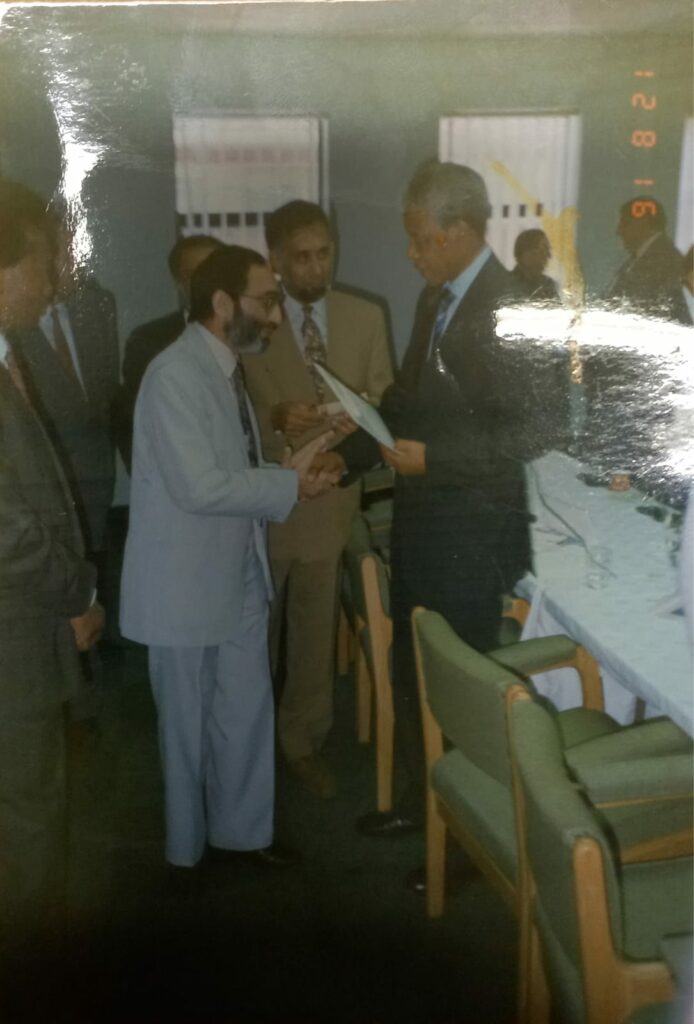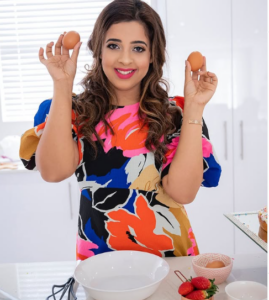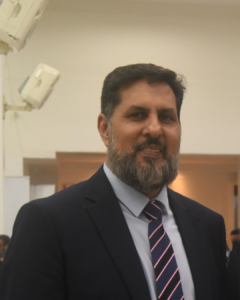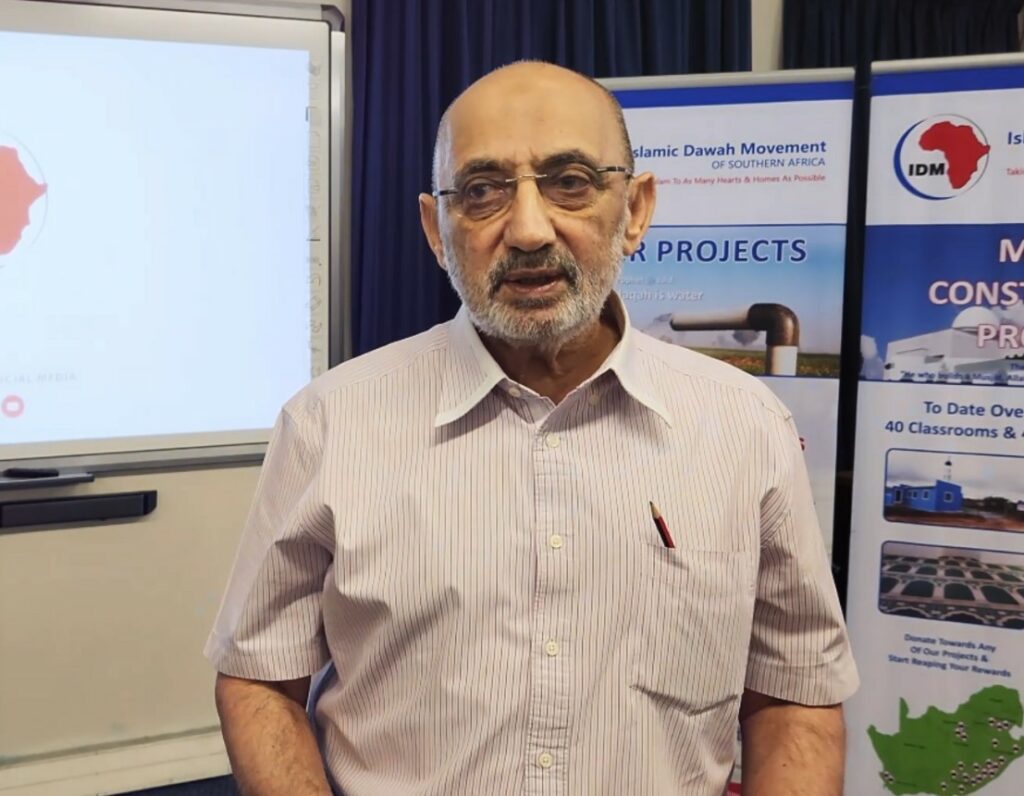
At 81, Dr Dada says he has no intention of stepping down from the Islamic Dawah Movement (IDM) that he co-founded 45-years ago. He spoke to Nabeelah Shaikh.
For more than 40 years, Dr Ebrahim Dada has dedicated his life to spreading the message of Islam across Southern Africa.
A medical doctor by profession, Dada who is now 81 years old, gave up his career around the age of 40 to focus on building the Islamic Dawah Movement (IDM). This is an organisation he co-founded in 1977.
Dada graduated with his medical degree from Natal University.
He went on to obtain his diploma in anaesthetics and then a masters’ degree in community health. Despite having these prestigious qualifications, his heart had been set on growing the IDM. This is when he took the decision to resign from medicine.
“I often get asked this question, why did I choose to leave medicine to do this instead? And I don’t have the answer to that. For me, it was Taqdeer. It happened by the will of Allah,” said Dada. More than four decades later, he has no regrets.
His love and passion for the IDM is reflected in the organisation’s achievements today.
The IDM remains one of the leading Dawah organisations in South Africa – with Dada at helm as its national executive director.
For Dada, his journey with the IDM began when he was still a practicing doctor in the 1970s.
“At the time, I ran a practice in Shallcross, Durban. I started a Quran class with some of my regular patients once a week. While doing this, I was then asked to see some very poor people in Marianhill, and how we could assist them. And so, that’s when the work of the IDM began,” said Dada
Communities
“From there it spread to other communities such as Isipofu on the South Coast of KwaZulu-Natal, who heard about the work we were doing. They approached us for assistance too,” he added.
As the IDM grew to become one of the largest Dawah movements in South Africa, much of its focus was on building masjids in remote rural communities, something it continues to do today.
“To date we have built 81 masjids in rural communities. Along with this, a big part of the IDM’s work has also been to translate the Quran in different languages, and to print and distribute it to communities,” said Dada.
Dada said the IDM first began printing the Quran in Afrikaans. Thereafter, the IDM undertook a project to translating the Quran from scratch, printing and distributing the Quran, in at least eight different languages. This includes isiXhosa, Afrikaans, Chichewa, isiZulu, Sotho, Portuguese, Yao and Runyankore. With this aspect, came the distribution of Qurans.
Dada says the organisation has distributed more than 160 000 Qurans to date.
Aside from the building of masjids, and the distribution of Islamic literature, the IDM is also actively involved in community empowerment programmes.
“This includes computer classes, cooking, home based courses, and educational training. We also do a bit of feeding and welfare but that isn’t the primary focus of the IDM. As an example, we would ensure we feed the kids who attend our Madressahs,” said Dada.
The IDM also runs a Distance Learning School. During the height of the COVID-19 pandemic, the IDM was able to continue with some of its daily training programmes, thanks to this.
There are also many annual programmes that form part of the IDM’s work. This includes their annual jalsas and the Ramadan Iftar programmes which the organisation runs.
The IDM employs about 50 individuals on a full and part-time basis. This includes some of the Imams, Alims and teachers that work at the masjids built by the organisation.
The IDM currently operates on an annual budget of between 8-9 million rand a year.
Dada says Awqaf, investments, fundraising and donations are what keeps the organisation afloat.
Dada also shared that Dr Ahmad Mohamed Ali Al-Madani, the President of the Islamic Development Bank, has played a significant role in helping grow the IDM through the years.
Dada also highlighted that the IDM is not isolated in its work.
“We work with several organisations in matters of dawah and community upliftment projects and programmes. Some of the sister organisations that have networked with IDM include the South African Hajj and Umrah Council, Muslim Relief Alliance, Caring Sisters Network, Gift of the Givers, and Islamic Relief SA, among others. We work with many organisations on both a local and national level,” said Dada.
While many his age would much rather be focused on enjoying their retirement years, Dada says one of his main goals for the future of the organisation is to continue to print the Quran in different languages.
“This is especially important for communities where it’s not available in their languages. The aim is to be able to take it to those communities. That will remain one of the core focuses and the other would be to continue with the building of masjids in remote rural areas,” said Dada.
He said the IDM is currently in the process of building a masjid in a rural community in Polokwane, also in QwaQwa in the Free State and in a community just outside Pretoria.
